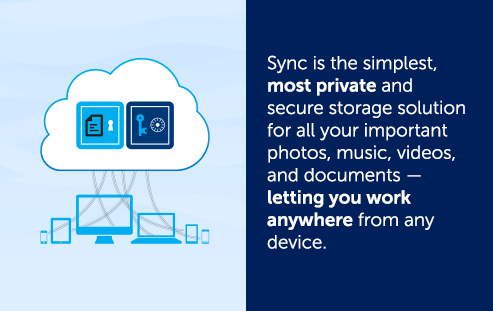From soup to search warrants
by Jason on Aug 8, 2014 9:26:17 AM

We talk a lot about how we store encrypted data on our servers, and you’re the only one with access to the key. To us, your data on our servers is a big jumbled block of ones and zeros.
Imagine a very special can of alphabet soup. With your magic can opener — your private key — the complete works of Shakespeare fall out of the can, perfectly organized in tomato bisque. Without the magic opener it’s just an aluminum can that nobody can see inside. And even if they cracked it open with a hammer, let’s say, the contents would just be a scrambled mess of noodles.
So it’s a bit concerning when people you don’t know also have magic can openers. Other cloud storage providers, like Microsoft, Dropbox, and Google, all have keys to your data. And last month, a judge in New York ruled that search warrants in the U.S. extend to digital information — even if that information wasn’t stored in the U.S.
Here in Toronto, we know that this (and other, domestic laws surrounding subpoenas for digital information) applies to us as well. As good citizens, we’re prepared to cooperate with law enforcement when absolutely necessary, but not at the expense of protecting our users’ private information.
If, hypothetically, we were served with one of these search warrants for a user’s data, we would be compelled to turn over that data, and we would. What we would hand over, however, would be that metaphorical magic can of soup — utterly useless without the opener.
Since you are the only one with the key, we can’t turn that over as part of a legal request for information either — simply because we don’t have it. It’s the primary way we keep your data private only to you.
Storage providers like Microsoft, Dropbox, and Google keep a copy of your private key. Judicially, they can be compelled to hand that over too, allowing access to your data, for better or worse.
Providing the safest, most private place to store your data online is paramount. Our entire datacenter is designed from the ground up to keep your data only yours — regardless of who’s asking for it.
- September 2025 (3)
- August 2025 (1)
- July 2025 (3)
- June 2025 (1)
- May 2025 (1)
- April 2025 (1)
- February 2025 (2)
- January 2025 (1)
- December 2024 (1)
- November 2024 (2)
- October 2024 (5)
- September 2024 (6)
- August 2024 (3)
- July 2024 (6)
- June 2024 (4)
- May 2024 (4)
- April 2024 (7)
- March 2024 (4)
- February 2024 (5)
- January 2024 (5)
- December 2023 (1)
- November 2023 (3)
- October 2023 (3)
- September 2023 (2)
- August 2023 (5)
- July 2023 (2)
- June 2023 (4)
- May 2023 (2)
- March 2023 (2)
- February 2023 (1)
- January 2023 (3)
- December 2022 (1)
- November 2022 (3)
- October 2022 (2)
- August 2022 (3)
- July 2022 (1)
- June 2022 (1)
- May 2022 (2)
- April 2022 (1)
- March 2022 (2)
- January 2022 (4)
- December 2021 (2)
- October 2021 (3)
- September 2021 (3)
- August 2021 (1)
- July 2021 (5)
- June 2021 (4)
- May 2021 (3)
- April 2021 (4)
- March 2021 (5)
- February 2021 (2)
- January 2021 (5)
- December 2020 (1)
- November 2020 (2)
- September 2020 (1)
- August 2020 (1)
- July 2020 (1)
- May 2020 (1)
- April 2020 (1)
- March 2020 (3)
- February 2020 (1)
- November 2019 (1)
- October 2019 (1)
- August 2019 (1)
- May 2019 (1)
- April 2019 (1)
- February 2019 (1)
- January 2019 (2)
- December 2018 (1)
- October 2018 (2)
- September 2018 (4)
- June 2018 (1)
- May 2018 (1)
- March 2018 (1)
- January 2018 (2)
- December 2017 (2)
- November 2017 (2)
- September 2017 (1)
- August 2017 (2)
- May 2017 (2)
- April 2017 (1)
- January 2017 (2)
- July 2016 (3)
- June 2016 (3)
- February 2016 (1)
- November 2015 (1)
- September 2015 (1)
- August 2015 (4)
- May 2015 (4)
- January 2015 (2)
- October 2014 (1)
- September 2014 (1)
- August 2014 (2)
- July 2014 (5)
- June 2014 (2)
- March 2014 (1)
- December 2013 (1)
- October 2013 (1)
- September 2013 (1)
- July 2013 (4)
- June 2013 (2)
- April 2013 (1)
- February 2013 (1)
- January 2013 (1)
Subscribe by email
You May Also Like
These Related Articles

Cloud Services for Law Firms: Moving, Managing and Maximizing Your Practice

Unboxing Petabytes of Storage
